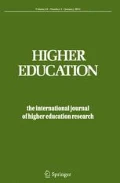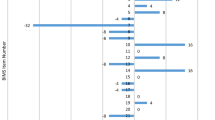Abstract
The main objective of the Bologna Process is to create a “European space” for higher education that allows for comparability, compatibility, and coherence between the existing systems of higher education across Europe. This objective is commonly known as the European higher education area (EHEA). The creation of the EHEA is a new and specific challenge for higher education in Europe, one that depends upon improved faculty development and training across Europe. The integration of Spain and other European countries into European higher education more generally entails these challenges. In order for necessary changes in faculty development and training to take place, university managers and policy makers must account for designing training plans, as well the knowledge, attitudes and needs of faculty members. This investigation was undertaken with these themes in mind. Conducted in Madrid, Spain, it included 257 professors from ten different schools of the Universidad Complutense de Madrid. The aim of the investigation was to understand faculty knowledge and attitudes about changes in higher education in Europe. Moreover, with an eye to helping faculty members cope with the change that is accompanying the creation of EHEA, the investigators sought to understand the importance that faculty members place upon professional development and how current approaches to professional development at the university level could be improved. The results indicate a degree of ignorance regarding changes in European higher education as well as a feeling of resistance on the part of many faculty members. While many faculty members consider knowledge of change processes and adaptability to be important qualities, faculty responses also indicate a clear need for guidance if they are going to integrate new learning models and adequate coping strategies into their work in higher education.
Similar content being viewed by others

Notes
Academic Titles of the UCM faculty in the most Spanish public universities (the translation is the closest possible to US titles):
Permanent: University Full professor, University Associate professor, College Full professor, College Associate professor (employees of the State) and Ph.D. Professor (permanent contracted).
Temporary: Collaborator, Part time Instructor, Ph.D. Teacher Assistant and Teacher Assistant.
References
Ball, D. L., & Cohen, D. K. (1996). Reform by the book: What is–or might be- the role of curriculum materials in teacher learning and instructional reform? Educational Researcher, 25(9), 6–8.
Calderón, C., & Escalera, G. (2008). La evaluación de la docencia ante el reto del Espacio europeo de educación superior (eees). Revista Educación, XX1(11), 237–256.
Calvo-Bernardino, A., & Mingorance-Arnáiz, A. C. (2009). La estrategia de las universidades frente al Espacio de Educación Superior. Revista Complutense de Educación, 20(2), 319–342.
Consejo de Coordinación Universitaria. (2007). Propuestas para la Renovación de las Metodologías Educativas en la Universidad. Madrid: Comisión para la Renovación de las Metodologías Educativas en la Universidad Ministerio de Educación y Ciencia.
Davies, J. L. (1998). The shift from teaching to learning: Issues of staffing policy arising for universities in the twenty-first century. Higher Education in Europe, 33(3), 307–316.
De Miguel, M. (Dir.) (2005). Modalidades de enseñanza centradas en el desarrollo de competencias orientaciones para promover el cambio metodológico en el espacio europeo de educación superior.http://www.mec.es/educa/jsp/plantilla.jsp?id=910&area=ccuniv.
Declaración de Bolonia. (1999). Declaración conjunta de los Ministros Europeos de Educación. Bolonia, 19 de Junio de 1999, http://www.esib.org.
DeSeCo. (2002). Definition and selection of competences: Theoretical and conceptual foundations. Strategy paper. Paris: OECD.
Ferrer, F. (dir.) (2004). Las opiniones y actitudes del profesorado universitario delante el Espacio Europeo de Educación Superior: Propuesta para la implementación del sistema de créditos europeos (ECTS). Barcelona: Universidad Autónoma de Barcelona. http://univ.micinn.fecyt.es/univ/html/informes/estudios_analisis/resultados_2004/ea0109/EA2004-0109.pdf.
Gaff, J. G., & Simpson, R. D. (1999). Faculty development in the United States. Innovative Higher Education, 18(3), 167–176.
Gibbs, G., & Coffey, M. (2004). The impact of training of university teachers on their teacher skills, their approach to teaching and the approach to learning of their students. Active Learning in Higher Education, 5, 87–100.
González Sanmamed, M. (2006). Análisis de las iniciativas de formación y apoyo a la innovación en las universidades españolas para la promoción del proceso de convergencia europea. Informe del Proyecto de investigación EA 2006-0072 del Programa de Estudios y Análisis. Dirección General de Universidades. MEC. http://www.centrorecursos.com/mec/ayudas/CasaVer.asp?P=29~~212~~.
González, N., & Lobato, C. (2008). Evaluación de las competencias sociales en estudiantes de enfermería (The evaluation of social competences in Nursery students). Bordón. Revista de Pedagogía, 60(2), 91–105.
Major, C. M., & Palmer, B. (2006). Reshaping teaching and learning: The transformation of faculty pedagogical content knowledge. Higher Education, 51, 619–647.
MEC. (2007). PISA 2006. Programa para la Evaluación Internacional de Alumnos de la OCDE: INFORME ESPAÑOL, Madrid, Secretaría General Técnica Subdirección General de Información y Publicaciones.
Molero López Barajas, D. (2007). Rendimiento académico y opinión sobre la docencia del alumnado participante en experiencias piloto de implantación del Espacio Europeo de Educación Superior RELIEVE, v. 13, n. 2. http://www.uv.es/RELIEVE/v13n2/RELIEVEv13n2_2.htm.
Monereo, C. & Pozo, J. I. (Eds.) (2003). La Universidad ante la nueva cultura educativa. Enseñar y aprender para la autonomía. Madrid: Ed. Síntesis.
Nigaard, C., Hojlt, T., & Hermansen, M. (2008). Learning-based curriculum development. Higher Education, 55, 33–50.
Prosser, M., et al. (2003). Dissonance in experience of teaching and its relation to quality of student learning. Studies in Higher Education, 28(1), 37–48.
Proyecto Tunning. (2003). http://www.relint.deusto.es/TUNINGProject/spanish/doc2_fase1.asp.
Ramsdem, P. (1992). Learning to teaching in higher education. London: Rouledge.
Rué, J. (2009). El cambio en la Universidad, sus epistemologías y consecuencias de las mismas. Revista Complutense de Educación, 20(2), 295-317.
Sánchez, F. (coord.) (2005). Modelos de formación del profesorado y su valoración para el Espacio Europeo de Educación Superior. Informe del Proyecto de investigación EA 2005-150 del Programa de Estudios y Análisis. Dirección General de Universidades. MEC. Documento electrónico: http://www.centrorecursos.com/mec/ayudas/CasaVer.asp?P=29~~151~~.
Shulman, L. (1986). Those who understand: Knowledge growth in teaching. Educational Researcher, 15(2), 4–14.
Shulman, L. (1987). Knowledge and teaching: Foundations of the new reform. Harvard Educational Review, 57(1), 1–22.
Shulman, L. (1991). Ways of seeing, ways of knowing: Ways of teaching, ways of learning about teaching. Journal of Curriculum Studies, 23(4), 393–395.
Stes, A., Gijbles, D., & Van Petegen, P. (2008). Student-focused approaches to teaching in relation to context and teacher characteristics. Higher Education, 55, 255–267.
Trigwell, K., Prosser, M., & Waterhouse, F. (1999). Relations between teachers’ approaches to teaching and students’ approaches to learning. Higher Education, 37, 57–70.
Valcárcel, M. (coord.) (2003). La preparación del profesorado universitario español para la convergencia europea en educación superior. Informe del proyecto de investigación EA 2003-0040 del Programa de Estudios y Análisis. Dirección General de Universidades. MEC. http://www.centrorecursos.com/mec/ayudas/CasaVer.asp?P=29~~36~~.
Valcárcel, M. (coord.) (2004). Diseño y validación de actividades de formación para profesores y gestores en el proceso de armonización europea en educación superior. Informe del Proyecto de Investigación EA 2004-0036 del Programa de Estudios y Análisis. Dirección General de Universidades. MEC. http://www.centrorecursos.com/mec/ayudas/CasaVer.asp?P=29~~63~~.
Villa, A., & Poblete, M. (2007). Aprendizaje basado en competencias. Una propuesta para la evaluación de las competencias genéricas. Bilbao: Universidad de Deusto.
Acknowledgement
We acknowledge Professor Cara Candal (Boston University) her review of the translation into English.
Author information
Authors and Affiliations
Corresponding author
Rights and permissions
About this article
Cite this article
Fernández Díaz, M.J., Carballo Santaolalla, R. & Galán González, A. Faculty attitudes and training needs to respond the new European Higher Education challenges. High Educ 60, 101–118 (2010). https://doi.org/10.1007/s10734-009-9282-1
Published:
Issue Date:
DOI: https://doi.org/10.1007/s10734-009-9282-1



